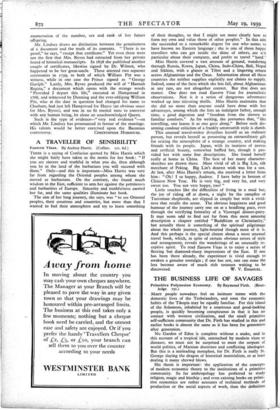A TRAVELLER OF SENSIBILITY
Eastern Visas. By Audrey Harris. (Collins. 12s. 6d.)
THERE is a saying of Confucius quoted by Miss Harris which she might fairly have taken as the motto for her book : "If you are sincere and truthful in what you do, then although you be in the land of the barbarians you will succeed with them." Only—and this is important—Miss Harris was very far from regarding the Oriental peoples among whom she moved as barbarians. On the contrary, she found much wisdom in the East, sufficient to arm her against the pettinesse.s and barbarities of Europe. Sincerity and truthfulness carried her far, and the same qualities illuminate her book.
The aim of her long journey, she says, was "to see Oriental peoples, their creations and countries, but more than that I wanted to feel their atmosphere and try to learn something of their thoughts, so that I might see more clearly how to form my own and value those of other peoples." In this aim she succeeded to a remarkable degree for one who seems to have known no Eastern language ; she is one of those happy travellers who can get inside the skins of others, are nit particular about their company, and prefer to travel "hard.'
Miss Harris covered a vast amount of ground, wandering through Russia, Korea, Japan, China, Indo-China, Bali, Nepal and Sikkim, with a glance at Tibet and a lingering return across Afghanistan and the Oxus. Information about all these countries she neither supplies explicitly nor claims to supply. Indeed, some of the facts which she lets fall, about Afghanistan at any rate, are not altogether correct. But that does not matter. One does not read Eastern Visas for journalistic observations. Nor is it a series of dangerous adventures worked up into titivating thrills. Miss Harris maintains that she did no more than anyone could have done with her advantages, among which she lists an indulgent father, enough time, a good digestion and "freedom from the slavery to familiar comforts." As for writing, she presumes that, "like travelling, one learns it as one goes along." Before such dis- arming candour criticism of a franldy amateurish style is dumb.
This unusual travel-writer describes herself as an ordinary person, but reveals herself as possessing an extraordinary gift for seizing the atmosphere of a strange country, and making friends with its people. Japan, with its tautness of nerves and artificial beauty, somewhat baffled her, though it pro- vided her with some fine descriptions. She found herself really at home in China. The best of her many character- sketches are drawn there. Most vivid of all is Big Lin, silk merchant of Peking. Big Lin's dearest wish was for a son. At last, after Miss Harris's return, she received a letter from him : "Oh! I so happy, Audrey. I have baby in bottom of Chinese New Year. He is very big, and very fat, and very sweet too. You not very happy, too?"
Little touches like the difficulties of living in a mud hut, the joy of riding off at dawn, a night by the campfire of Turcoman shepherds, are slipped in simply but with a vivid- ness that recalls the scene. The obvious happiness and good humour of the journey carry one on at a headlong pace, even through the terrifying formality of a Viceregal dinner-party. It may seem odd to find not far from this most amusing description a chapter entitled "Buddhism or Christianity," but actually there is something of the spiritual pilgrimage about the whole journey, light-hearted though most of it is. And this perhaps is the special charm about a most unusual travel book, which, in spite of certain obvious errors of style and arrangement, reveals the wanderings of an unusually re- ceptive spirit. To read Eastern Visas is to enjoy a series of fleeting but diamond-sharp impressions of the East. If one has been there already, the experience• is vivid enough to awaken a genuine nostalgia ; if one has not, one can none the less become aware of much rich treasure waiting to be


















































 Previous page
Previous page